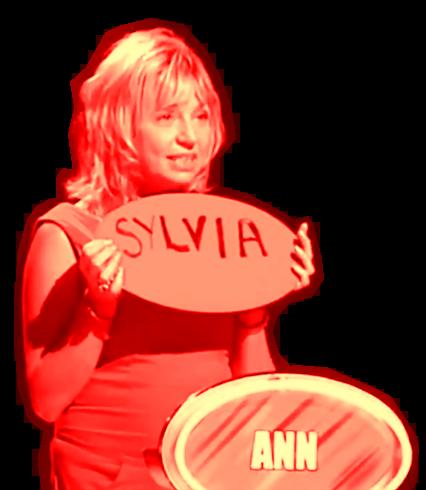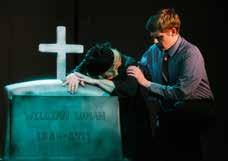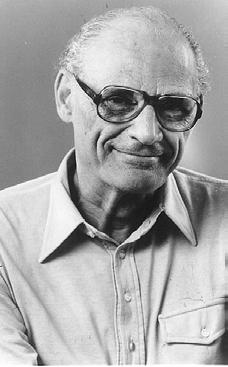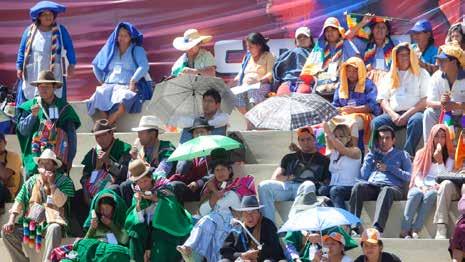
10 minute read
Patrick Clarke On Ann and Arthur
On Ann and Arthur
Patrick Clarke, History and Politics at St Peter's College
Advertisement

In an essay of February 1949 entitled ‘Tragedy and the Common Man’, the American playwright Arthur Miller argued that “the common man is as apt a subject for tragedy in its highest sense as kings were”. Miller wrote the essay just over a year after the opening of Death of a Salesman on Broadway, a play in which he used the dramatic form of tragedy to explore the demise of the archetypal post-WWII American ‘common man’ through the play’s protagonist, Willy Loman. The core of Miller’s argument in the 1949 essay is that the sense of tragedy is evoked in an audience when they see a character do anything, “if need be, to secure one thing – his sense of personal dignity”. An audience is shaken only when, according to Miller, they have to watch the dignity of a character be repeatedly wounded despite the heroic attempts of that character to fight back against the onslaught. For Miller, this spectacle is enlightening in how it reveals “man’s total compulsion to evaluate himself justly”.
If only Miller, in his final years (he died in 2005), watched The Weakest Link. Many of us, I am sure, were shocked by the footage from the well-known Noughties show that began to circulate about a month ago. It showed the host, Anne Robinson, eviscerate a contestant, Ann, in front of an audience which usually numbered between one and two million from week-to-week, simply because she was a single mother and she was poor. The responses varied, from calls (as yet unheeded) for the offer made to Robinson of hosting Countdown to be withdrawn, to Jason Okundaye’s article in Tribune, ‘The Blair Show’, which argues that The Weakest Link was one of many television shows that grew up under the Blair government precisely because their portrayal of the undeserving poor chimed with the New Labour view.
Miller is not famed for his presentation of women but, personally, it was Miller who helped me understand my own gut response to the clip. I believe that Miller’s ideas enlighten all of us on the left, regarding one of the fundamentals of our political mission: in fighting for the disadvantaged, we are fighting for their dignity, as well as their material well-being. Here’s the opening exchange between contestant and host:
Ann (contestant): I’m a full-time single mum to three boys… Anne Robinson: Three great boys?
Ann: Three great boys, yep… Anne Robinson: So how many ASBOs? Ann: Pardon me, what, sorry? Anne Robinson: ASBOs? Ann: Can you clarify that please, erm, nerves have taken over… Anne Robinson: Have they? Ann: Yeah, haha… Anne Robinson: How many of your three boys have got tags, on their ankles? Ann: Oh, erm, well none
The words alone convey how a “wound of indignity”, in Miller’s phrase, is immediately struck with the assumption that at least one of Ann’s children, simply because they have been raised by a single mother out of work, will have a serious problem with breaking the law. The brutality of the host’s intentions is hinted at with the question, "Have they?" when Ann admits to feeling nervous; Robinson smells blood and knows that Ann’s dignity is there for the taking. What we can also see is the attempt by Ann to fight back, emphasizing with a smile how the boys are “great boys”. This is without the body language, whether that be Robinson’s hungry grin, or Ann’s nervous laughter. The exchange proceeds as follows:
Anne Robinson: So are you doing benefits?
Ann: I knew, I was waiting for this, aha, erm, I’m doing a 24/7 job, really…
Anne Robinson: Are you on benefits?
Ann: I, I, I am on benefits, yes.
“I was waiting for this”, Ann says. This reveals how she knows that her having collected benefits is an existing wound to her dignity of which she may, at any time, be reminded by anyone and everyone. She tries to justify herself, to recover what Miller would describe as “her rightful place in the world”, but the host is simply not interested, unfortunately neglecting to consider how she would fare as a single mother with sole responsibility for three human lives. Thus, Ann has to make a stuttering confession, looking down at the ground as she says it. Miller wrote that tragedy, as a dramatic form, should be used by the playwright to “question absolutely everything”, any “institution, habit or custom” which is regarded as “being either everlasting, immutable or inevitable”. Perhaps the shaming of those who ask the state for help in times of need has, since 1979, become one of these customs in our time.
The exchange then comes to its close:
Anne Robinson: So what happened to the husband?
Ann: Well I’ve had two husbands, to be honest…I think I’ve worn them both out.
Anne Robinson: You didn’t go gay did you?
Ann: No but sometimes, living with three boys, I have thought there’s a lot to be said for going lesbian.
Anne Robinson: Is there? Well you don’t have to say a lot about going lesbian, just tell us a little…
Not content with wounding Ann’s dignity on the counts of her motherhood or her class, the host now has a go at her sexuality, trivializing homosexual nature just for the fun of it. Ann’s attempt to laugh along with the onslaught shows how, by this point in the exchange, she feels powerless to assert her dignity, and has chosen humour as the fragile scab over salt-rubbed wounds.
"One of the fundamentals of our political mission: in fighting for the disadvantaged, we are fighting for their dignity, as well as their material well-being"

Still from Death of a Salesman


Arthur Miller
In his 1949 essay, Miller himself relates his ideas to progressive political change, in arguing that the compulsion of the human animal to evaluate themself justly was at the core of the various revolutions that had occurred between the end of the World War I and his time of writing. I believe it is equally applicable to how we on the left desire to change British society, both in the distribution of wealth and its wider political culture.
A lot of the policy change we call for from the left involves improvements in a material sense. We stood behind Marcus Rashford this winter so that the nutritional constitution of children from low-income backgrounds was not imperiled this summer. We celebrated the recent High Court judgement regarding the employment status of Uber drivers because we want an Uber driver to enjoy her summer holiday as much as the lawyers who represented her, without fearing a loss of pay. We want police reform so that women and ethnic minorities do not feel like they are in physical danger when they walk down the street.
However, without meaning to denigrate the critical importance of this material change, I believe that all of the left's ideals pertain to something deeper and more psychological, something which Miller understood in 1949, and which was harshly revealed to us in that clip of Anne vs Ann: dignity.
Miller believed that the "tragic flaw", an essential element of the dramatic tragedy formula, amounted to little more than the “inherent unwillingness to remain passive in the face of what he [the tragic hero] conceives to be a challenge to his dignity, his image of his rightful status”. In her barbed remarks, the lashing out of what Okundaye argues was a poisonous political culture, Anne Robinson posed this challenge to Ann. It is the same challenge felt by an Uber driver when she closes the EasyJet tab after checking her meagre payslip. Dawn Butler doubtlessly felt it when her friend’s car was stopped by police in August. It is a psychological challenge that sits beside the fear of a young woman who chooses to wear a belt for a night out or asks her male pal to walk with her for at least a part of the journey. It is a challenge which reddens the cheeks of a child in a packed school-meal queue when they see one of their peers notice their ‘free meal’ status flash up on the till. Furthermore, it is a crippling burden on the proud residents of the small towns and cities that we as a party have left behind.
The pathos of these images is the powerlessness of the individual whose dignity is challenged because, as with Willy Loman in Death of a Salesman, the individual is challenged by forces beyond their control. Miller establishes a canon of such hopeless but irresistibly admirable struggles, from Greek tragedy, through Job in the Old Testament and Shakespearean tragedy towards the present day. We must see the struggle of contestant Ann in this vein, in the sense that she tried to maintain her dignity in the face of a powerful figure in front of millions. We need not, however, confine Ann and the group in society whom she represents to the realm of inevitable demise. This is where our own efforts as a political party come in.
I must stress here that well-intentioned individuals on the right are fighting the same fight. One may argue, for example, that the dignity of the individual is most truly respected and protected by the freedom of choice guaranteed by a market economy that is properly run, as opposed to the market system we have currently. What I am not trying to do here is argue that the left respects the dignity of human beings more than the right.
Rather, I am trying to say that a concern for human dignity should be at the core of everything that all political activists say and do. When we forget this, we fall prey to crass, summary judgements of large groups of people that reduce them to ignominy and rid them of their humanity. We allow the development of the political culture which allowed, perhaps even encouraged, Anne Robinson’s evisceration of Ann. We must always fight against the notion of the undignified poor. We must not allow justified efforts to prevent absentee fatherhood to become criticism and shaming of single motherhood, and we must try our best to ensure financial stability for single mothers across the country. We should be proud of how, through our Deputy Leader, we have put a successful single mother on a pedestal and thus proclaimed that to be a single mother is not to live in shame. We must use collective action to fight for the dignity of those, like Ann, challenged by forces greater than them.
In the 1996 poem ‘Postscript’, detailing a hurried car journey through the west of Ireland, Seamus Heaney writes,
“…You are neither here nor there, A hurry through which known and strange things pass As big soft buffetings come at the car sideways And catch the heart off guard and blow it open”
In the uncertain and ever-changing circumstances of the pandemic, it can often feel like we are neither here nor there. The clip of Ann on The Weakest Link caught the hearts of many off guard and blew them open. It made me wish we had a Miller who could articulate the politics of Ann’s personal story, and caricature figures such as Robinson, as Miller did to the American managerial class with the character of Howard in Death of a Salesman. Perhaps the most saddening detail of the affair is that we know nothing of where Ann or her three sons are now, and so we cannot recover any sense of justice for them as a family.
However, we can try and create a more just state of affairs for those like them, those whose dignity is constantly under the weight of the various levers of injustice in our society but whose struggles to retain it, unlike that of Ann, go unrecorded. In bringing together Arthur and Ann, hopefully we can be reminded of how, in our own efforts, it is for this dignity that we fight. We fight to assist the disadvantaged individual in their compulsion to evaluate themselves justly.










